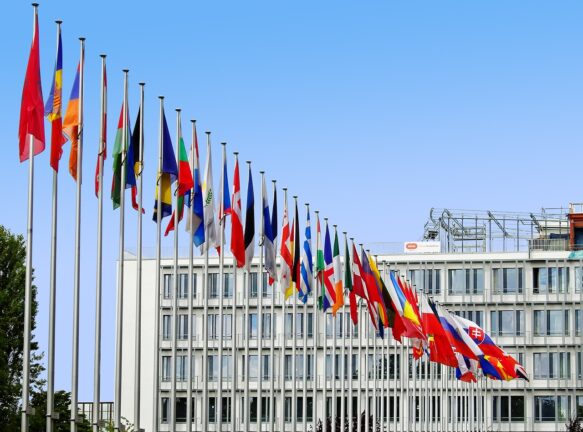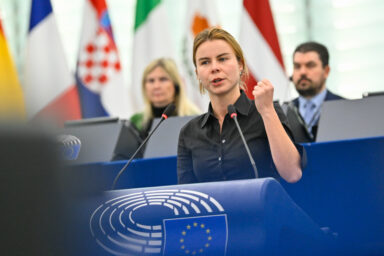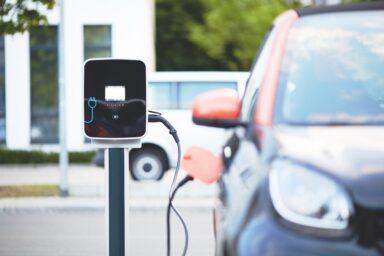The EU-US trade deal exposed the Europeans‘ institutional frailties, critics claim. Member states, scrambling to protect national industries, weakened Brussels’ negotiating position. The overall impression is that the bloc, lacking both unity and strategy, comes across as weak.
The EU-US tariff deal agreed on 27 July 2025 at the Trump Turnberry Golf Course in Scotland sparked disagreements across Europe, both immediate and fierce. The accord, negotiated in haste between European Commission President Ursula von der Leyen and US President Donald Trump, imposed a 15 per cent flat tariff on most EU exports to the US – half the 30 per cent initially threatened – while exempting strategic goods like aircraft parts and critical raw materials. Pharmaceuticals and semiconductors secured inclusion in the 15 per cent rate after Brussels pledged €750bn in US energy purchases, €600bn in US investments, and tariff-free market access for American products.
Necessary, but negative results
European Commission officials framed the deal as a necessary compromise. “Tariffs are bad for consumers and businesses – full stop. We would all have much preferred a true zero-for-zero outcome,” an anonymous European diplomat told Politico, “but this outcome is clearly better than the 30 per cent tariff we would have been facing in four days’ time.” Ms von der Leyen, addressing reporters at Glasgow’s Prestwick Airport, insisted the deal “delivers stability and predictability for citizens and businesses on both sides of the Atlantic.”
Germany’s export-driven economy breathed cautious relief. Chancellor Friedrich Merz called the agreement a bulwark against “a trade conflict that would have hit the export-oriented German economy hard,” noting it “safeguarded core interests” despite unmet hopes for further easing.
Donald Trump ate Ursula von der Leyen for breakfast. The American president is a heavyweight negotiator, Madam President is featherweight. – Viktor Orbán, Prime Minister of Hungary
The auto sector, which exported $34.9bn of cars and parts to the US in 2024, however, did not let on how relieved it felt in its immediate response. Wolfgang Niedermark of Germany’s BDI industry federation lambasted the deal as “an inadequate compromise” with “immense negative consequences for Germany’s export-oriented industry.” He added: “The EU is accepting painful tariffs. Even a 15 per cent tariff will have immense negative consequences.”
Vive la capitulation!
France struck a combative tone. Benjamin Haddad, the French minister for European affairs, demanded retaliation via the EU’s anti-coercion instrument, which could target US tech firms and block American companies from European public procurement. “Let’s be clear: the current situation is not satisfactory and sustainable,” he declared on social media. “The free trade that has brought shared prosperity to both sides of the Atlantic since the end of the Second World War is now rejected by the United States, which is choosing economic coercion and complete disregard for WTO rules.”
Prime Minister François Bayrou went even further, calling the deal “a dark day when an alliance of free peoples, united to affirm their values and defend their interests, opts for submission.” The confrontational attitudes appeared at odds with what their superiors pushed for. Both France and Germany, facing domestic populist threats, prioritised short-term economic protection over long-term strategy. “National governments weren’t prepared to risk economic pain to challenge Trump,” said an insider quoted by Bloomberg.
You might be interested
France lobbied to shield Champagne and wine from retaliation lists, while Germany pushed for car-sector exemptions. Paris and Berlin’s public posturing thus masked private appeasement efforts. France demanded anti-coercion measures but privately pushed for wine-sector protections; Germany touted unity but undermined EU leverage to shield automakers. Berlin’s fixation on its automakers led Mr Merz to demand a “quick and simple deal” without clarifying terms – a stance critics called strategically myopic.
Devil in the detail
Eastern Europe’s reactions split somewhat untraditionally. Hungarian Prime Minister Viktor Orbán, a frequent Brussels critic, mocked Ms von der Leyen’s negotiating prowess: “Donald Trump ate Ursula von der Leyen for breakfast. The American president is a heavyweight negotiator, Madam President is featherweight.”
Slovak Prime Minister Robert Fico, Mr Orbán’s usual ally, did not agree for once, striking a pragmatic note. He called 15 per cent “a good negotiation result” but cautioned that the devil was “hidden in the details.” Slovakia’s car industry accounts for 10 per cent of the country’s GDP. With its car plants owned by Volkswagen, Stellantis, and Kia exposed to tariff risks, the uncertainty bites hard.
The deal’s lack of detail fuelled scepticism. MEP Brando Benifei (S&D/ITA), who chairs the delegation for relations with Washington, noted: “We seem to have gotten worse conditions than the UK,” referencing London’s 10 per cent tariff agreement. “That’s not a good starting point, and we need to look at the details to understand what we actually get, because it is – to be frank – not clear at all from the declarations we have seen.”
Given the nature of the deal, major uncertainties are likely to persist. – Carsten Nickel, deputy director of Teneo, a global consultancy
Trade experts warned of “interpretation and implementation risk”. Carsten Nickel of Teneo, a global consultancy, noted: “Given the nature of the deal, major uncertainties are likely to persist.”
Academics decried the accord as a capitulation. Clemens Fuest of Germany’s Ifo Institute called it “a humiliation” reflecting EU weakness: “The Europeans need to wake up, focus more on economic strength and reduce their military and technological dependence on the US. Then they can renegotiate.”
Cautious optimism
Market reactions were cautiously optimistic. European stocks rose, with the Stoxx 600 gaining 0.7 per cent, as investors welcomed reduced trade-war risks. Analysts noted the deal narrowed the range of worst-case scenarios. “The potential for an all-out trade war has retreated somewhat, which is reassuring,” analyst John Stepek wrote in a Bloomberg commentary. Yet lingering ambiguities – such as whether pharmaceutical tariffs were fully resolved – left industries uneasy.
Historical parallels loomed large. The EU’s conciliatory approach echoed its handling of US steel tariffs under President Biden, when Brussels lifted retaliatory measures while Washington retained some. This time, internal divisions hollowed out retaliation plans. “If the commission had accepted all those requests, the lists would have been completely hollowed out,” said one official quoted by Financial Times.
The deal’s fallout may reshape EU-US relations. French Trade Minister Laurent Saint-Martin urged Brussels to resume talks: “I don’t want to stop with what happened yesterday. That would be accepting that Europe is not an economic power.” Yet with Trump securing concessions on energy purchases and investments, Europe’s bargaining power appears diminished.
Mixed forecasts
Economic analysts offered mixed forecasts. While Bloomberg Economics noted the average US tariff rate would drop to 16 per cent from a projected 18 per cent, the EU’s pre-Trump average was just one per cent. Researchers argued the deal reflected “Europe’s lack of consensus, low pain threshold and strategic dependence on the US.” Markets, however, focused on reduced uncertainty. “Your risk of disappointment with US stocks is higher than it is with the European option,” advised Cedric Gemehl and Tom Holland of research group Gavekal, citing divergent valuations.
It’s the best we could get. – Ursula von der Leyen, European Commission President
The human cost remained contentious. German auto workers, French winemakers, and Slovak manufacturers now face disrupted supply chains and squeezed margins. “Depending on which side of the political fence you fall, you can make an argument for tariffs falling entirely on the US consumer via higher prices, or you can make the case that companies will swallow them,” noted Bloomberg’s Simon White. With the deal’s text still unwritten, businesses brace for bureaucratic battles.
In the end, the agreement underscored Europe’s fragmented state. Ms von der Leyen’s claim that it was “the best we could get” is probably true, under the circumstances, even as critics saw a pattern of capitulation. The EU’s negotiating flaws showed, not due to external foes, but its own disunity, as Hungary’s Mr Orbán – the continent’s divider-in-chief – quipped. The road ahead, fraught with implementation hurdles and political recriminations, promises to test whether Europe can reconcile national interests with collective strength.











